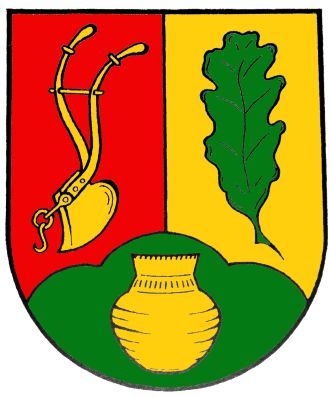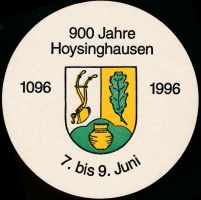Hoysinghausen: Difference between revisions
Jump to navigation
Jump to search
Knorrepoes (talk | contribs) m (Text replacement - "|'''English''' ↵| {{blazon wanted}}↵" to "|'''English''' | blazon wanted ") |
Knorrepoes (talk | contribs) No edit summary |
||
| Line 1: | Line 1: | ||
{| class="wikitable" | |||
|- style="vertical-align:top;" | |||
|[[File:Hoysinghausen.jpg|center|350 px|alt=Wappen von {{PAGENAME}}/Arms (crest) of {{PAGENAME}}]] | |||
| | |||
<center>''' {{uc:{{PAGENAME}}}} '''</center><br> | |||
'''Country''' : Germany [[File:germany.jpg|60 px|right]]<br><br><br><br> | |||
'''State''' : [[Niedersachsen]][[File:Niedersachsen.jpg|60 px|right]]<br><br><br><br> | |||
'''District (Kreis)''' : [[Nienburg (kreis)|Nienburg]][[File:Nienburg.kreis.jpg|60 px|right]]<br><br><br><br> | |||
'''Incorporated into''':<br> | |||
* 1974 [[Uchte]] | |||
{{#display_map:52.5293,8.8277|width=250|height=250|zoom=7}} | |||
|} | |||
[[File:Hoysinghausen.jpg|center|alt=Wappen von {{PAGENAME}}/Arms (crest) of {{PAGENAME}}]] | [[File:Hoysinghausen.jpg|center|alt=Wappen von {{PAGENAME}}/Arms (crest) of {{PAGENAME}}]] | ||
| Line 30: | Line 36: | ||
[[Civic Heraldry Literature - Germany|'''Literature''']]: Ziegler, 1997 | [[Civic Heraldry Literature - Germany|'''Literature''']]: Ziegler, 1997 | ||
{{de1}} | {{de1}} | ||
{{media1}} | {{media1}} | ||
[[Category:German Municipalities | [[Category:German Municipalities H]] | ||
[[Category:Niedersachsen]] | [[Category:Niedersachsen]] | ||
[[Category:Nienburg]] | [[Category:Nienburg]] | ||
Revision as of 13:26, 24 July 2023
|
Country : Germany State : Niedersachsen District (Kreis) : Nienburg Incorporated into:
|
| German |
Über grünem Dreiberg. darin eine golden Urne, gespalten von Rot und Gold, vorne ein goldener Pflug, hinten ein grünes Eichenblatt. |
| English | blazon wanted |
Origin/meaning
The municipality never had arms prior to 1974. The above arms were designed in 1987.
The plough is a symbol for the agricultural character of the village. The area was characterised by different landscapes; the moors and heath, the hills of the Böhrde and more sandy soils. The red is the colour of the heather, the oak represents the forests on the sandy (golden) soil. The base shows the local hills and an urn, found in the 'Hünenkeller' (Hun's cellar), symbolising the longtime settlements in the area.
Literature: Ziegler, 1997




